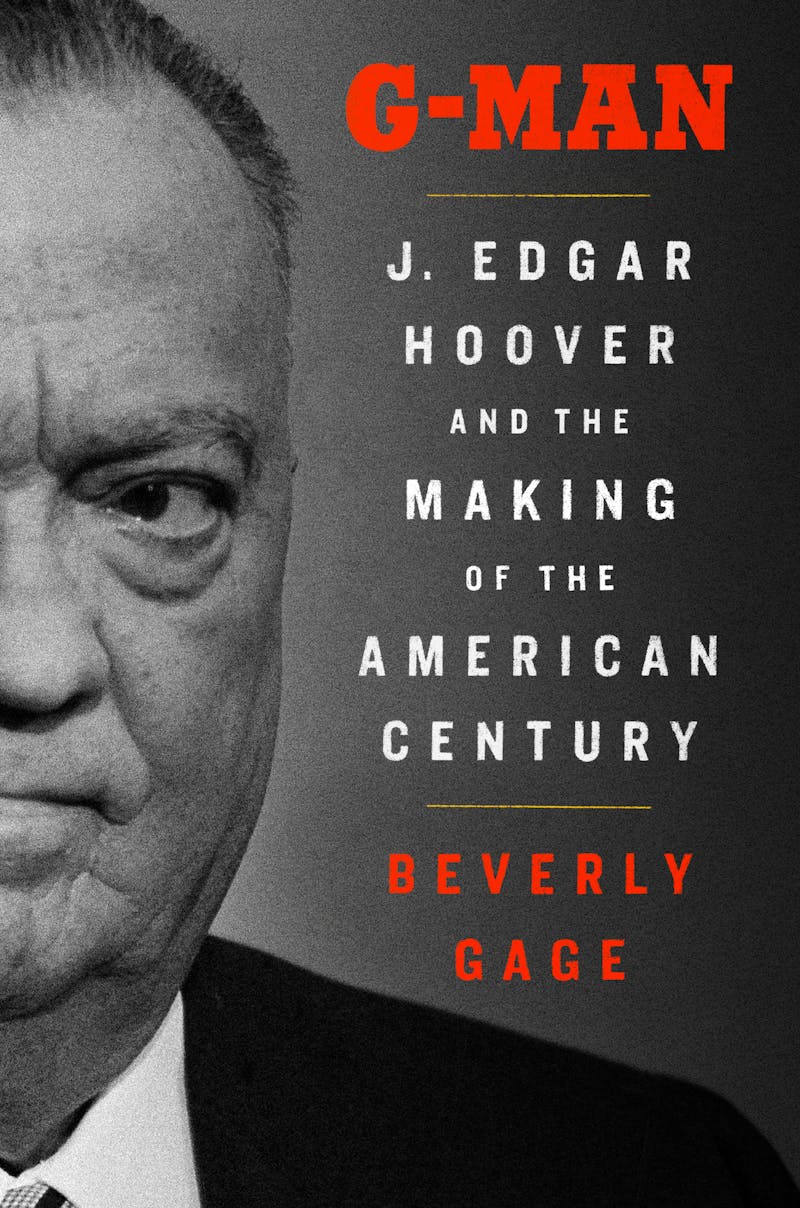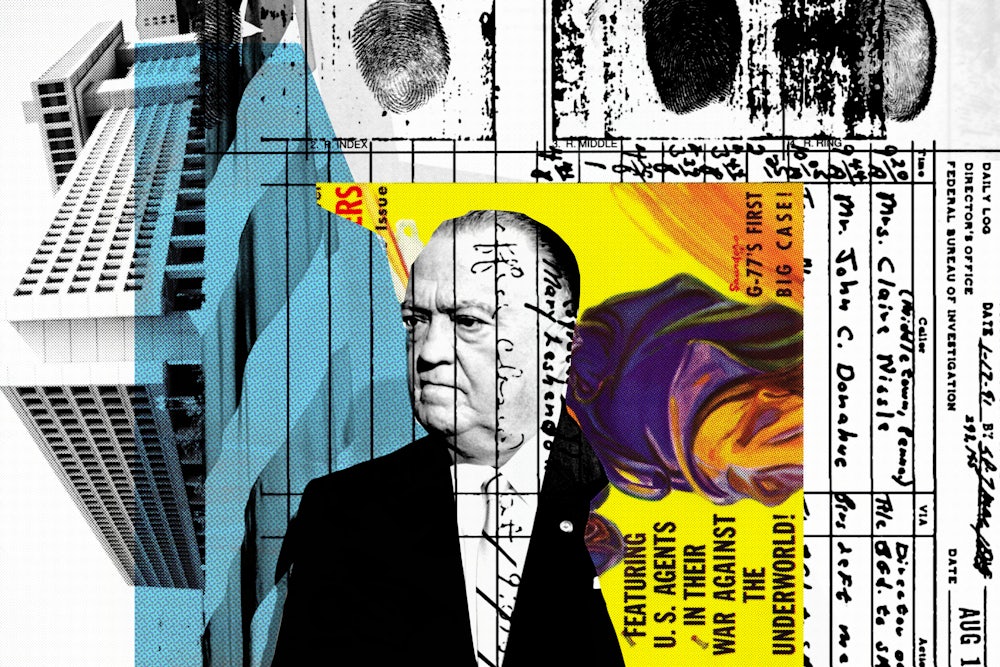“Abolish the FBI!” New Leftists might have demanded half a century ago—if they thought the idea had the slightest chance of being taken seriously. The bureau, radicals correctly assumed, was bent on dividing and destroying their movements. Undercover agents moled inside antiwar and Black power groups, amassing voluminous files on thousands of activists. Other operatives wiretapped hotel rooms where Martin Luther King Jr. stayed to record him having extramarital sex. Knowledge of the tapes, they hoped, would force the civil rights leader to abandon the cause or even drive him to suicide. FBI Director J. Edgar Hoover had long vowed to protect the nation from “subversives” of all kinds. Thousands of his minions were dispatched to pursue that mission.
After the FBI recovered classified documents from Mar-a-Lago in August, zealots such as Marjorie Taylor Greene turned that bygone whim of the left into a combative hashtag for the right. Since FBI agents began looking into the affairs of Donald J. Trump in 2016, his MAGA apostles have consistently accused the bureau of being the citadel of a “Deep State” that means to rip away the liberties of every patriotic citizen. “Political Hacks and Thugs,” the former president cursed the FBI agents who conducted the search of his resort. Tucker Carlson even accused the bureau of inciting the January 6 assault on the Capitol.
If that ideological turnabout seems ironic, Beverly Gage’s magnificent biography of Hoover, G-Man: J. Edgar Hoover and the Making of the American Century, shows how the institution has always been something of a moving political target. In absorbing detail and lapidary prose, Gage, a historian at Yale, makes clear that Hoover designed his bureau to be a potent tool for advancing the security needs of a growing national government—no matter which president or party controlled it. To be sure, Hoover’s own politics were steadfastly conservative and white supremacist; while in law school at George Washington University, he joined a fraternity drenched in the romance of the Confederacy and remained loyal to its “Southern sentiments” throughout his life. His determination to destroy the Communist Party also made him a darling of the right during the Cold War. But he gladly served the political needs of both Franklin Roosevelt and Lyndon Johnson, those paragons of New Deal liberalism. In gratitude, LBJ, relates Gage, “showered” the FBI director “with Christmas gifts and phone calls, lunch invitations and pleas for elder-statesman wisdom” and even called him “my brother and personal friend.”

Above all, Hoover deserves to be remembered as a primary architect of the modern administrative state, whatever one thinks of its purposes. To learn how he expanded the FBI’s powers and thus his own is to understand something essential about high politics that historians who focus narrowly on public dramas and their outcomes often miss. As Gage observes: “Hoover’s popular image suggests that exercising power is a simple task: press a few buttons, whisper in a few ears, twist a few arms, and presto, the world opens up. The truth is that power does not simply arrive. It has to be created, policy by policy, law by law, step by excruciating step.” Those who master such an incremental approach create structures that will endure and likely prosper, long after an egomaniac like Trump is gone.
Hoover spent his entire adult life engaged in a relentlessly methodical quest to enhance the powers of the state. In doing so, he was following a family tradition, although none of his forebears achieved anything like his influence and fame. Nearly all his closest male forebears worked in one government job or another. His paternal grandfather had been a trusted employee of the Coast Survey, a scientific arm of the early American state, while his mother’s father, a Swiss immigrant, held the highest post in the old country’s Washington embassy. Hoover’s father was a career-long employee of the Coast Survey, too. Being a “G-man”—a government man—was thus encoded in Edgar’s DNA, decades before the catchy term became ubiquitous in the 1930s.
Born in 1895, Hoover grew up a few blocks from the U.S. Capitol and attended the premier public high school in the city—a segregated one, of course. His climb up the ladder of state began in 1913, when he took a job at the Library of Congress processing the deluge of published materials that flowed into the institution. The teenager quickly mastered the library’s fairly new classification system, which is now standard all over the United States. Six years later, the wave of mass strikes and bombings that followed World War I gave the Justice Department an excuse to create a Radical Division. Hoover’s “ability to sort immense amounts of data and to find it when needed” made him an ideal choice to run it; under his guidance, clerks collected intelligence on over 100,000 immigrant radicals deemed treacherous enough to deport. In 1924, Hoover took the helm of the DOJ’s fledgling Bureau of Investigation (renamed the FBI in 1935).
His command of the institution was absolute until he died 48 years later. Hoover easily swatted away the occasional attempt to replace him as director. To appreciate such longevity, imagine if a key member of Abraham Lincoln’s government had remained in his position until Woodrow Wilson moved into the White House—the same year Henry Ford’s assembly line began turning out the Model T.
Gage quietly demolishes the notion that Hoover lasted so long in high office because he accumulated secret, damning files on any president who might have considered replacing him. In truth, the director endured in power because he was so adept at executing the desires of more powerful men. In 1919, at the behest of Attorney General A. Mitchell Palmer, he rounded up and deported anarchists and anti-draft activists, including Emma Goldman and Alexander Berkman. During the 1930s, he pleased FDR by turning the bureau into the armed scourge of celebrated criminals like John Dillinger and Bonnie and Clyde. In the late 1940s and 1950s, he played a major role in the domestic Cold War waged by leaders of both major parties: FBI informants collected documents used to convict leaders of the U.S. Communist Party of advocating a violent revolution, and his agents uncovered the atomic espionage plot that led to the executions of Julius and Ethel Rosenberg. In 1958, his ghost-written polemic against communism, Masters of Deceit, soared on the bestseller list, with a boost from his own agents who could earn raises and bonuses for hawking the most copies.
All this won the director the type of appeal any politician would envy. During the Great Depression, “G-Man” films churned out by Hollywood and popular radio shows about the FBI—with titles like Show Them No Mercy and Gangbusters—made its director as famous as the villains he had sent his agents to hunt down. A 1936 photo of Hoover aiming a submachine gun got reproduced in newspapers and magazines around the country. At mid-century, a Gallup survey reported that just 2 percent of the public had strong objections to the only unelected government employee in the nation nearly everyone could name. In 1964, after Hoover had called Dr. King “the most notorious liar in the country” for criticizing the FBI’s failure to protect civil rights workers, he still enjoyed “the solid backing of nearly 8 of 10 Americans,” according to another polling firm. Tucker Carlson and Marjorie Taylor Greene would surely have been among his biggest fans.
Not until the end of the 1960s did Hoover’s reputation lose its glow. His aggressive campaign against what he deemed to be the “anarchistic” New Left got him in trouble with liberals and civil libertarians who opposed the war in Vietnam and championed civil rights. He also jousted with high officials in the Nixon administration, who wanted him to use the FBI to take further, and potentially illegal, actions against their enemies in the New Left and the liberal press. Then, in 1971, a group of antiwar activists broke into an FBI office in Media, Pennsylvania, and made off with thousands of documents that, when published in major newspapers, revealed how flagrant were the bureau’s efforts to wreck the young left. They included Hoover’s order to surveil every union of Black students in the nation because of the “violence, destruction, confrontations and disruptions” they allegedly caused. Under a secret program labeled COINTELPRO, about 1,000 FBI informants spied on groups like Students for a Democratic Society and the Black Panther Party; one of them helped set up the murders of Fred Hampton and Mark Clark, leaders of the Illinois chapter of the Panthers, in a 1969 predawn raid while both men lay in bed.
I was a young radical at the time, and my FBI file, blackened with numerous redactions, shows that, with help from its informants, the bureau was assiduously tracking where I lived and worked, which protests I attended, and when I traveled to other cities.
Publication of the Media documents—which contained clear evidence of abuses many had long suspected—gave Hoover’s liberal critics an opportunity to flail the director more openly than ever before. Democrats planning to run for president in 1972, when they would need strong backing from the peace movement, called on Congress to investigate the FBI and accused Hoover of violating the rights of peaceful demonstrators. Senator George McGovern, who would become the party’s nominee, flatly declared, “Hoover should have resigned 25 years ago. He has become paranoid.” The New York Times scorned the director as “THE MAN WHO STAYED TOO LONG.”
If the general public had learned the intimate details of the head G-man’s private life, his tenure would likely have been quite a bit shorter. From 1930 until Hoover’s death in 1972, his second-in-command at the FBI was Clyde Tolson, a Missouri-born lawyer five years his junior. Gage is careful not to claim more knowledge of their relationship than the documentary record makes clear. But she leaves no doubt that, for decades, the two lived much like a married couple. They took nearly all their vacations together and sometimes shared lodgings. One photo depicts the squat, bulldog-faced director with an arm draped around the tall, handsome Tolson; another shows them sharing a private word, while relaxed and shirtless. The duo frequented such iconic nightspots as New York’s Stork Club, and powerful businessmen and politicians routinely invited them to the same small dinner parties.
What occurred after the director’s passing should have revealed the truth to anyone who wondered if the two men were merely just the closest of friends. Clyde Tolson was the chief beneficiary of Hoover’s will and received the flag that had been placed on his coffin. One tribute quoted a busboy at the Mayflower, their favorite D.C. hotel, who recalled “how he always buttered Hoover’s toast on both sides, then trimmed off the crusts and cut it into two equal pieces—‘one for Mr. Hoover, one for Mr. Tolson.’”
That touching anecdote does not prevent Gage from pointing out the FBI’s complicity in the Lavender Scare, which drove many closeted gay men and lesbians out of federal employment during the early Cold War. The agency amassed the names of hundreds of government workers arrested as “sex deviates.” Most, if not all, the suspects undoubtedly lost their jobs. But, perhaps for self-protection, Hoover drew the line against questioning or fingering anyone not discovered having sex in a public place. He also managed to squash an inquiry into allegations that Senator Joseph McCarthy, during the heyday of his malevolent career, had gotten an Army lieutenant drunk and then “committed an act of sodomy” on him. Hoover treated such cases the same way he did any investigation into the affairs, sexual or otherwise, of a figure whose power might augment his own: “discreetly, and with due attention to political consequences.”
That last phrase nicely captures what makes Gage’s biography such a convincing and significant work. Her Hoover was, with rare lapses of judgment, a master operator in a federal government whose size and potency grew unceasingly during his lifetime. Years of digging through all the relevant archives—hundreds of thousands, if not millions, of documents—enable her to write with unparalleled authority and confidence about a man and an agency now more despised than understood. In the process, she highlights key details that standard narratives neglect or obscure—for example, that Hoover disapproved of FDR’s decision to intern thousands of Japanese Americans in “relocation” camps during World War II, or that he undermined the KKK in the 1960s “with the same methods he had used to good effect against” the Communist Party and Martin Luther King Jr. Gage seems to know all the secrets or, at least, all those Hoover, Tolson, and company felt inclined to preserve. In over 800 pages of text, G-Man seldom loses narrative drive or offers less than a persuasive analysis of her subject’s deeds or motivations.
Only recently has the public perception of the FBI begun to change. In February 2022, this magazine published a cover story by Timothy Noah, defending the work that millions of federal employees do in the face of neglect from most Americans and derision and hostility from the right. These workers “held the government together, during four long years under Trump,” wrote Noah, “In many ways, they saved the Republic.” While Washington, D.C., is often described as a swamp, it’s hard to think of “anyplace else where so many idealistic people allow their visions of a better society to govern their everyday lives.”
Until Trump began damning the FBI as part of the “Deep State” investigating him, I never heard a liberal or leftist say anything good about the bureau. But through most of Hoover’s tenure, most Americans would have associated the virtues that Noah lists with the institution Hoover built (and whose massive, ugly headquarters in downtown D.C. bears his name). Both Democrats and Republicans agreed about the need for an organization that might provide “security”—whether from violent crime or political radicals—and so the budget and staff of the FBI kept growing. Until the early 1970s, polls reported that large majorities of Americans trusted the government to “do what is right” most of the time—a sentiment the bureau both contributed to and benefited from. When, for quite different reasons, both progressives and conservatives got accustomed to excoriating whoever was running the country, the FBI became as vulnerable to political attack as any other federal institution.
But whether the power of the U.S. government should be large or limited has never been a useful question. The better one to ask is: Whose interests and ideology does the government serve? The roughly 36,000 women and men who now work for the FBI are just as committed to sleuth out wrongdoing as those serving under the reign of the G-man supreme. But without the shred of a consensus among Americans about what that is, they are probably doomed to satisfy neither left nor right for very long, and are not likely to regain either the power or respect that Hoover worked so fiercely—and effectively—to win.






